初中英语时态整理
初中所有英语时态
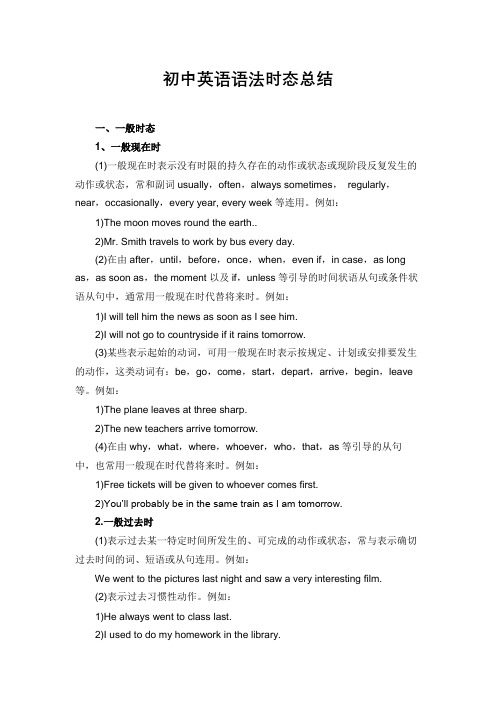
初中英语语法时态总结一、一般时态1、一般现在时(1)一般现在时表示没有时限的持久存在的动作或状态或现阶段反复发生的动作或状态,常和副词usually,often,always sometimes,regularly,near,occasionally,every year, every week等连用。
例如:1)The moon moves round the earth..2)Mr. Smith travels to work by bus every day.(2)在由after,until,before,once,when,even if,in case,as long as,as soon as,the moment以及if,unless等引导的时间状语从句或条件状语从句中,通常用一般现在时代替将来时。
例如:1)I will tell him the news as soon as I see him.2)I will not go to countryside if it rains tomorrow.(3)某些表示起始的动词,可用一般现在时表示按规定、计划或安排要发生的动作,这类动词有:be,go,come,start,depart,arrive,begin,leave 等。
例如:1)The plane leaves at three sharp.2)The new teachers arrive tomorrow.(4)在由why,what,where,whoever,who,that,as等引导的从句中,也常用一般现在时代替将来时。
例如:1)Free tickets will be given to whoever comes first.2)You’ll probably be in the same train as I am tomorrow.2.一般过去时(1)表示过去某一特定时间所发生的、可完成的动作或状态,常与表示确切过去时间的词、短语或从句连用。
初中英语八大时态归纳总结
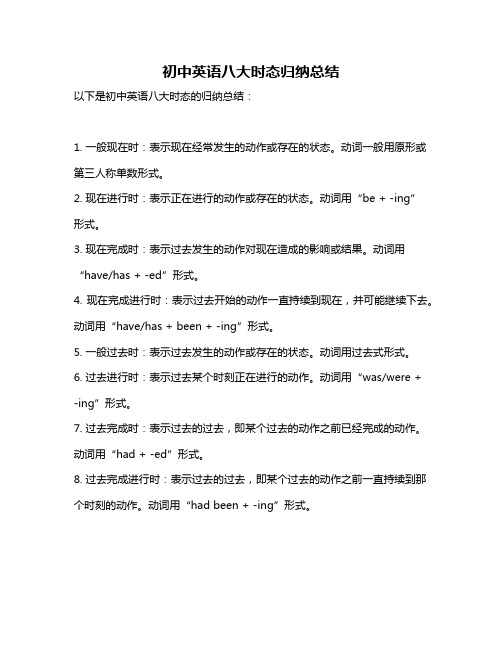
初中英语八大时态归纳总结
以下是初中英语八大时态的归纳总结:
1. 一般现在时:表示现在经常发生的动作或存在的状态。
动词一般用原形或第三人称单数形式。
2. 现在进行时:表示正在进行的动作或存在的状态。
动词用“be + -ing”
形式。
3. 现在完成时:表示过去发生的动作对现在造成的影响或结果。
动词用“have/has + -ed”形式。
4. 现在完成进行时:表示过去开始的动作一直持续到现在,并可能继续下去。
动词用“have/has + been + -ing”形式。
5. 一般过去时:表示过去发生的动作或存在的状态。
动词用过去式形式。
6. 过去进行时:表示过去某个时刻正在进行的动作。
动词用“was/were + -ing”形式。
7. 过去完成时:表示过去的过去,即某个过去的动作之前已经完成的动作。
动词用“had + -ed”形式。
8. 过去完成进行时:表示过去的过去,即某个过去的动作之前一直持续到那个时刻的动作。
动词用“had been + -ing”形式。
以上是初中英语的八大时态,理解和掌握这些时态对于英语学习和交流非常重要。
初中英语8个时态归纳总结
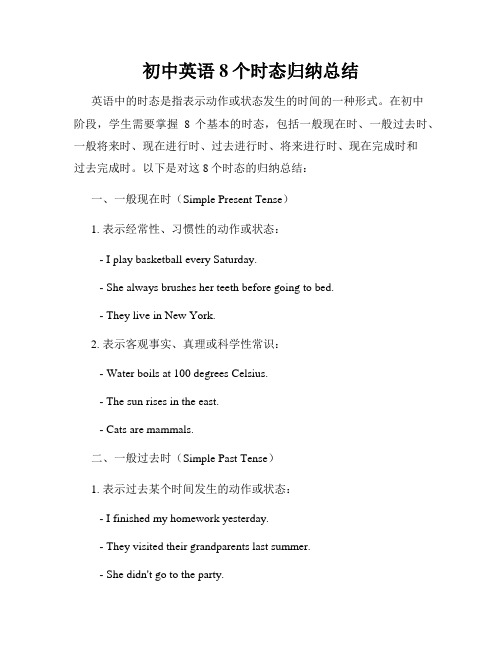
初中英语8个时态归纳总结英语中的时态是指表示动作或状态发生的时间的一种形式。
在初中阶段,学生需要掌握8个基本的时态,包括一般现在时、一般过去时、一般将来时、现在进行时、过去进行时、将来进行时、现在完成时和过去完成时。
以下是对这8个时态的归纳总结:一、一般现在时(Simple Present Tense)1. 表示经常性、习惯性的动作或状态:- I play basketball every Saturday.- She always brushes her teeth before going to bed.- They live in New York.2. 表示客观事实、真理或科学性常识:- Water boils at 100 degrees Celsius.- The sun rises in the east.- Cats are mammals.二、一般过去时(Simple Past Tense)1. 表示过去某个时间发生的动作或状态:- I finished my homework yesterday.- They visited their grandparents last summer.- She didn't go to the party.2. 表示过去的经历或习惯:- When I was young, I often went swimming. - He always ate breakfast at 8 o'clock.三、一般将来时(Simple Future Tense)1. 表示将来要发生的动作或事件:- I will go shopping tomorrow.- They are going to have a picnic next week. - She won't be late for the meeting.2. 表示将来的打算或意愿:- I am going to be a doctor when I grow up.- We will help you with your project.四、现在进行时(Present Continuous Tense)1. 表示现在正在进行的动作:- We are studying English at the moment.- He is playing soccer with his friends.- They aren't watching TV right now.2. 表示现阶段的趋势或变化:- The population is increasing rapidly.- More and more people are using smartphones.五、过去进行时(Past Continuous Tense)1. 表示过去某一时间段内正在进行的动作:- I was reading a book when the phone rang.- They were cooking dinner at 7 o'clock.2. 表示过去的同时发生的两个动作:- She was listening to music while doing her homework.六、将来进行时(Future Continuous Tense)1. 表示将来某一时间段内正在进行的动作:- Tomorrow, they will be flying to Paris.- I will be waiting for you at the station.2. 表示将来的预测或计划:- This time next month, I will be studying for my exams.七、现在完成时(Present Perfect Tense)1. 表示过去某一时间发生的动作对现在造成的影响或结果: - I have finished my homework, so I can watch TV now.- She has already eaten lunch.2. 表示过去某一时间内多次发生的动作:- We have visited that museum several times.八、过去完成时(Past Perfect Tense)1. 表示过去某一时间点之前已经完成的动作:- By the time they arrived, we had already left.- I had finished my work before the deadline.2. 表示过去的顺序或先后关系:- She realized that she had forgotten her keys after she locked the door.以上是初中英语的8个时态的归纳总结。
初中英语八大时态公式
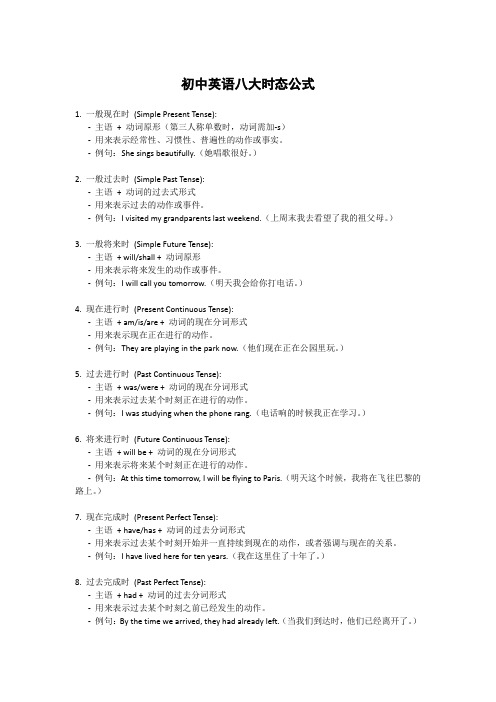
初中英语八大时态公式1. 一般现在时(Simple Present Tense):-主语+ 动词原形(第三人称单数时,动词需加-s)-用来表示经常性、习惯性、普遍性的动作或事实。
-例句:She sings beautifully.(她唱歌很好。
)2. 一般过去时(Simple Past Tense):-主语+ 动词的过去式形式-用来表示过去的动作或事件。
-例句:I visited my grandparents last weekend.(上周末我去看望了我的祖父母。
)3. 一般将来时(Simple Future Tense):-主语+ will/shall + 动词原形-用来表示将来发生的动作或事件。
-例句:I will call you tomorrow.(明天我会给你打电话。
)4. 现在进行时(Present Continuous Tense):-主语+ am/is/are + 动词的现在分词形式-用来表示现在正在进行的动作。
-例句:They are playing in the park now.(他们现在正在公园里玩。
)5. 过去进行时(Past Continuous Tense):-主语+ was/were + 动词的现在分词形式-用来表示过去某个时刻正在进行的动作。
-例句:I was studying when the phone rang.(电话响的时候我正在学习。
)6. 将来进行时(Future Continuous Tense):-主语+ will be + 动词的现在分词形式-用来表示将来某个时刻正在进行的动作。
-例句:At this time tomorrow, I will be flying to Paris.(明天这个时候,我将在飞往巴黎的路上。
)7. 现在完成时(Present Perfect Tense):-主语+ have/has + 动词的过去分词形式-用来表示过去某个时刻开始并一直持续到现在的动作,或者强调与现在的关系。
初中英语八种时态归纳
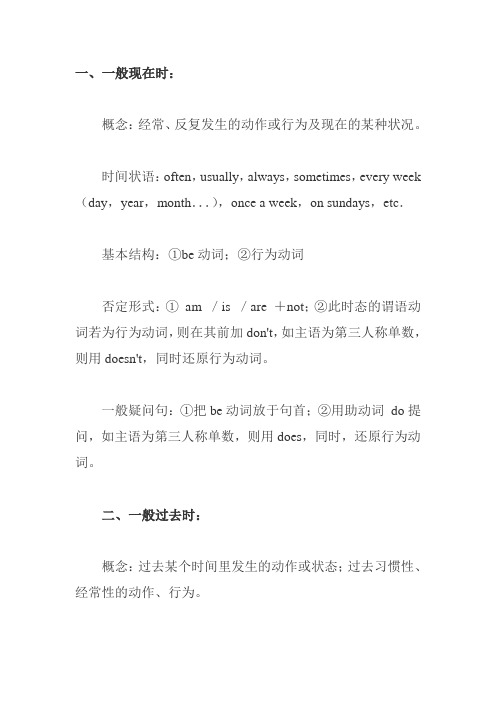
一、一般现在时:概念:经常、反复发生的动作或行为及现在的某种状况。
时间状语:often,usually,always,sometimes,every week (day,year,month...),once a week,on sundays,etc.基本结构:①be动词;②行为动词否定形式:①am /is /are +not;②此时态的谓语动词若为行为动词,则在其前加don't,如主语为第三人称单数,则用doesn't,同时还原行为动词。
一般疑问句:①把be动词放于句首;②用助动词do提问,如主语为第三人称单数,则用does,同时,还原行为动词。
二、一般过去时:概念:过去某个时间里发生的动作或状态;过去习惯性、经常性的动作、行为。
时间状语:ago,yesterday,the day before yesterday,last week(year,night,month...),in 1989,just now,at the age of 5,one day,long long ago,once upon a time,etc.基本结构:①be动词;②行为动词否定形式:①was/were +not;②在行为动词前加didn't,同时还原行为动词。
一般疑问句:①was或were放在句首;②用助动词do 的过去式did提问,同时还原行为动词。
三、现在进行时:概念:表示现阶段或说话时正在进行的动作及行为。
时间状语:now,at this time,these days,etc.基本结构:am/is/are +doing否定形式:am/is/are +not+doing一般疑问句:把be动词放在句首四、过去进行时:概念:表示过去某段时间或某一时刻正在发生或进行的行为或动作。
时间状语:at this time yesterday,at that time或以when 引导的谓语动词是一般过去时的时间状语等。
初中英语语法八大时态总结完整版
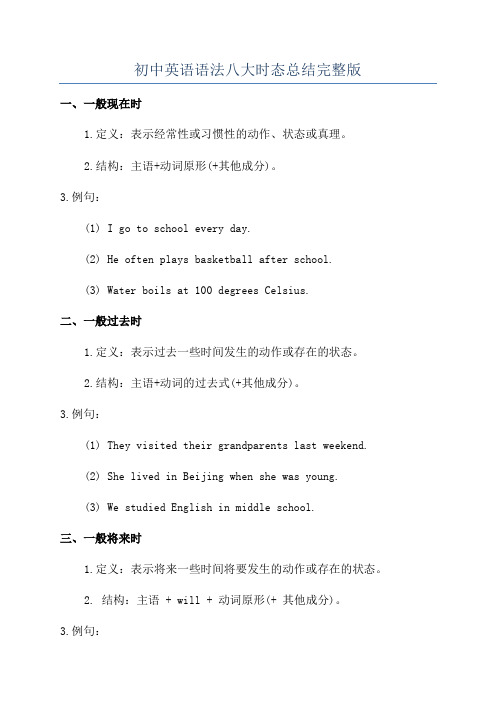
初中英语语法八大时态总结完整版一、一般现在时1.定义:表示经常性或习惯性的动作、状态或真理。
2.结构:主语+动词原形(+其他成分)。
3.例句:(1) I go to school every day.(2) He often plays basketball after school.(3) Water boils at 100 degrees Celsius.二、一般过去时1.定义:表示过去一些时间发生的动作或存在的状态。
2.结构:主语+动词的过去式(+其他成分)。
3.例句:(1) They visited their grandparents last weekend.(2) She lived in Beijing when she was young.(3) We studied English in middle school.三、一般将来时1.定义:表示将来一些时间将要发生的动作或存在的状态。
2. 结构:主语 + will + 动词原形(+ 其他成分)。
3.例句:(1) I will go to the park tomorrow.(3) We will have a party next week.四、现在进行时1.定义:表示现在正在进行的动作。
2. 结构:主语 + am/is/are + 动词-ing(+ 其他成分)。
3.例句:(1) She is reading a book right now.(2) They are playing soccer in the park.(3) We are having dinner at the moment.五、过去进行时1.定义:表示过去一些时间正在进行的动作。
2. 结构:主语 + was/were + 动词-ing(+ 其他成分)。
3.例句:(1) He was watching TV at 8 o'clock last night.(2) They were traveling in Europe during summer vacation.(3) We were studying when the phone rang.六、将来进行时1.定义:表示将来一些时间正在进行的动作。
初中英语知识点时态总结
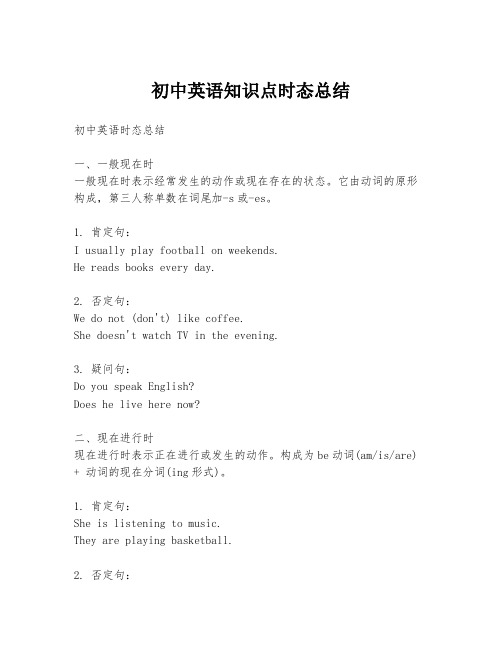
初中英语知识点时态总结初中英语时态总结一、一般现在时一般现在时表示经常发生的动作或现在存在的状态。
它由动词的原形构成,第三人称单数在词尾加-s或-es。
1. 肯定句:I usually play football on weekends.He reads books every day.2. 否定句:We do not (don't) like coffee.She doesn't watch TV in the evening.3. 疑问句:Do you speak English?Does he live here now?二、现在进行时现在进行时表示正在进行或发生的动作。
构成为be动词(am/is/are) + 动词的现在分词(ing形式)。
1. 肯定句:She is listening to music.They are playing basketball.2. 否定句:I am not (aren't) studying right now.The children are not (aren't) doing their homework.3. 疑问句:Is she cooking dinner?Are you waiting for someone?三、一般过去时一般过去时表示过去某个时间发生的动作或存在的状态。
规则动词在词尾加-ed,不规则动词则有特殊形式。
1. 肯定句:He walked to school yesterday.I visited my grandparents last week.2. 否定句:We did not (didn't) go to the cinema.She didn't buy anything at the store.3. 疑问句:Did you travel abroad last year?Did he finish his homework?四、过去进行时过去进行时表示过去某个时间点正在进行的动作。
初中英语语法八大时态总结(完整版)
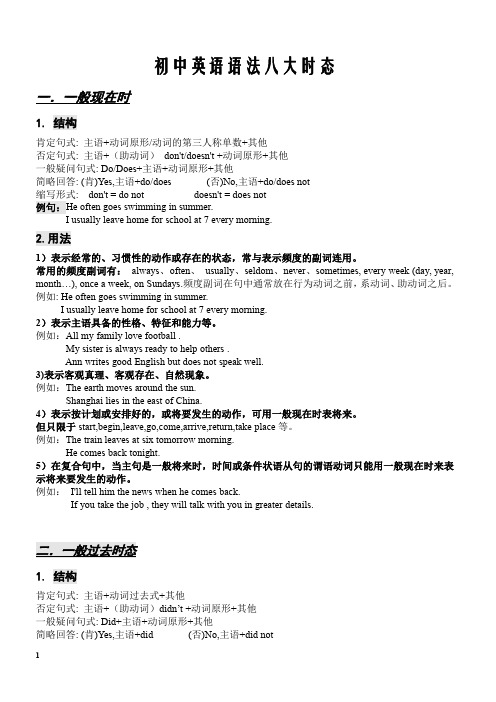
初中英语语法八大时态一.一般现在时1.结构肯定句式:主语+动词原形/动词的第三人称单数+其他否定句式:主语+(助动词)don't/doesn't+动词原形+其他一般疑问句式:Do/Does+主语+动词原形+其他简略回答:(肯)Yes,主语+do/does(否)No,主语+do/does not缩写形式:don't=do not doesn't=does not例句:He often goes swimming in summer.I usually leave home for school at7every morning.2.用法1)表示经常的、习惯性的动作或存在的状态,常与表示频度的副词连用。
常用的频度副词有:always、often、usually、seldom、never、sometimes,every week(day,year, month…),once a week,on Sundays.频度副词在句中通常放在行为动词之前,系动词、助动词之后。
例如:He often goes swimming in summer.I usually leave home for school at7every morning.2)表示主语具备的性格、特征和能力等。
例如:All my family love football.My sister is always ready to help others.Ann writes good English but does not speak well.3)表示客观真理、客观存在、自然现象。
例如:The earth moves around the sun.Shanghai lies in the east of China.4)表示按计划或安排好的,或将要发生的动作,可用一般现在时表将来。
但只限于start,begin,leave,go,come,arrive,return,take place等。
- 1、下载文档前请自行甄别文档内容的完整性,平台不提供额外的编辑、内容补充、找答案等附加服务。
- 2、"仅部分预览"的文档,不可在线预览部分如存在完整性等问题,可反馈申请退款(可完整预览的文档不适用该条件!)。
- 3、如文档侵犯您的权益,请联系客服反馈,我们会尽快为您处理(人工客服工作时间:9:00-18:30)。
初中英语时态整理作谓语的动词用来表示动作(情况)发生时间的各种形式称为时态。
构成:1.一般时态a.一般现在时用动词原形,但第三人称单数后要加词是-s/es;b.一般过去时用过去式;c.一般将来时用shall 或will 加动词原形;d.一般过去将来时用should 或would 加动词原形;2.进行时态: 助动词be+主要动词的现在分词(am/is/are/ was/ were doing)3.完成时态:助动词have+主要动词的过去分词(have/ had done)4.完成进行时态:助动词have+ been +主要动词的现在分词要点、难点:☺一般现在时1.第三人称单数后加s注意:以ch, sh, s, x, 或o 收尾的词加es; 以“辅音字母+y”结尾的词变y 为i 再加es;2.含义:a. 经常性或习惯性的动作b. 现在的特征或状态c. 普遍真理d.计划或时刻表3.常用时间状语:often, always, usually, sometimes, every day, once a week☺现在进行时1.少量动词可以用进行时表示在最近按计划或安排要进行的动作,如:go, come,leave, start, arrive, stay 等;2.表示一个经常性的动作或状态,或是表示一种感情(如赞叹、厌烦等),或是强调暂时性。
如: be always doing☺一般将来时1.在时间或条件状语从句中,一般不用将来时,而用现在时代替。
如:I’ll let youhave the book when I’m through. / I’ll be round to see you if I have time tomorrow.2.表示倾向或习惯性动作。
如:Oil will float on water.3.否定形式表示“不能……”“没法……”如: This machine won’t work.☺一般过去时1.发生的时间不是很清楚,但实际上是过去发生,应当用过去时。
如:I didn’tknow you were in town. / What did you say?2.谈到已死的人多用过去时,但有时也可以用现在时。
☺过去进行时过去进行时表示过去正在进行的动作;一般过去时表示一个完成的动作。
☺过去将来时1.表示从过去某时看将来要发生的事情。
如:He said he would raise the questionat the meeting.2.注意在间接引语中的使用。
☺现在完成时1.到现在为止的这一时期中发生的情况(可能是多次动作的总和,也可以表示状态和习惯性的动作);对现状有影响的某已发生的动作。
2.当有一个表示过去某时的状语(包括when)时,不能用现在完成时。
3.常用词:already, yet, just, as yet, ever, never, since4.区别:have been to & have gone to☺现在完成进行时1.表示现在以前这一段时间里一直在进行的动作,可能仍在进行,也可能停了一会儿。
2.可以用来强调时间的长久。
如: She has always been working like that.3.也可以用来强调现在以前这段时期反复发生的事情。
如:She’s been cyclying towork for the last three weeks.☺过去完成时1.表示过去的过去:过去完成时表示的动作较另一过去的动作先发生。
2.在包含when, as soon as, before, after, until, now that 等连词的复合句中,先发生的动作通常用过去完成时。
分类练习:I. 用动词的一般现在时或现在进行时填空1. A. What________you__________(think) of the idea?B. What________you__________(think) about?2. A. He__________(not look) his age.B. He _____________(look) for his glasses.3. A. I____________(have) a hard time trying to get this finished.B. I___________(have) a bad cold.4. A: Let’s go out. It _____________(not rain) now.B: It _______________(not rain) very much in summer.5.A. I _____________(live) some friends until I find a flat.B: My parents ___________(live) in London. They have lived there all their lives. II. 用动词的一般过去时或过去进行时填空1.While we _____________(wait) for the bus, a girl ___________(run) up to us.2.I ________________(telephone) a friend when Bob ____________(come) in.3.Jim _____________(jump) on the bus as it _____________(move) away.4.We ___________(test) the new machine when the electricity __________(go) off.5.She ______________(not want) to stay in bed when the others ____________(allwork) in the fields.6.While mother ______________(put) Kitty to bed, the door-bell__________(ring).7.It was quite late at night. George ______________(read) and Amy___________(rest) when they __________(hear) a knock at the door.III.用动词的现在完成时或一般过去时填空1.--- __________you _________(book) your hotel room yet?---Well, I ___________(write) to the hotel last week but they _______________(not answer) yet.2.---You _________just _________(agree) to go, so why aren’t you getting ready?---But I _________(not realize) that you ________(want) me to start at once.4.---I can’t find my gloves. ________you ________(see) them?---Yes, you _________(leave) them in the car yesterday. I ____________(put) them back in your drawer.5.---I hear that Mr Jones _____________(leave).---Yes, he ___________(leave) last week.---___________anyone ___________(take) his place?---I believe that several men ________________(apply) for the job but so far nothing ___________________(decide).IV. 用动词的一般过去时和过去完成时填空1.The heavy rain __________(stop), but there was still a slight drizzle in the air.2.I____________(cannot go) out that night, for I ________________(agree) to takecare of my younger sister at home.3.I ______________(not know) you ________________(be) so busy in the past fewweeks.4.The snow storm ______________(drop 减弱) as suddenly as it_______________(start). The wind________________(die) down and the sun ______________(come) out.5.Nobody agreed with him. That_____________(be) something he__________________(not predict) .V. 用动词的现在完成时和现在完成进行时填空1. The children ________________(watch) TV since noon. Will you stop them?2. They _________________(build) the road since 1978 and still __________________(not complete) it yet.3. Joe __________________(read) the book for only an hour, but ________________(cover) over thirty pages.4. We _________________(hope) to visit this place for many years, but still ___________________(not get) a chance to.5. We __________________(look) for it for a whole day and still ________________(not find) it.VI.用动词的一般过去时和过去将来时填空1. Whenever he __________(have) time, he ______________(help) them with their work.2. I ___________(think) things over in my mind: What __________(be) their reaction? ____________they ___________(support) the idea?3. He ____________(tell) me to come and wait under the tree the next morning. A young man ___________(meet) me there and ________(take)me to see the boss.4. The teacher asked Tom what he _________________( be going to, be) when he _____________(grow) up.5. Late at night on November 28 Dr Bethune ___________(get) news that a battle ___________(begin) soon.综合练习:I. 请选择正确答案1. —Is Runyang Bridge open to the public yet?—Yes. It ______ for almost one and a half months.A. has openedB. has been openedC. has been openD. was open2. —When did you borrow the English storybook?—I borrowed it last week. I______it for a weekA. have boughtB. have keptC. have borrowedD. had3. When Li Ming hurried home, he found that his mother ____already____to hospital.A has; been sentB had; sent C. has; sent D had; been sent4. –When_____he_____back? –Sorry, I don’t know.A. does,comeB.are comingC.is comeD.is coming5. Was it raining hard when you _____ this morning?A. leftB. leavesC. was leavingD. would leave6. What ______ from three to four yesterday afternoon?A have you doneB had you doneC did you doD were you doing7. —I’m looking for Mr White.—He was here just now. But he______to a meeting and he won’t be back until eleven o’clock.A. wasB. will beC. has goneD. has been8. Since 2000, Nanchang has become a new city. Everything______ .A. is changedB. was changedC. has changedD. had changed9. How can you possibly miss the news? It ____ on TV all day long.A.has beenB. had beenC. wasD. will be10. She asked him whether he _____ back for lunch.A .came B. was coming C. come D. had come11. —______ my dictionary? I can’t find it anywhere.—I______it on the shelf when I came in.A. Did you see, have seenB. Have you seen, sawC. Did you see, sawD. Have you seen, have seen12. By the end of 1976, many buildings _____built in the city.A. have beenB. haveC. had beenD. will be13. The meeting _____when Mr. Wang _____to school.A. has begun; getB. had begun; gotC. has been on; getD. had been on; got14. Nobody noticed what she ______ at the moment.A. will doB. was doingC. has doneD. had done15. Don’t talk here. My mother _____.A. is sleepingB.are sleepingC. sleeping D .sleep16. My mother _____ while my father _____TV.A. cooked; was watchingB. was cooking; was watchingC. had cooked; watchedD. cooked; watched17. —I heard your father______to Japan once.—Yes, he______there last year.A. went, has beenB. had been, wentC. goes,wentD. had been,has been18. Look! He _____their mother do the housework.A. is helpingB. are helpC. has helpedD.was helping19. —Wow, what a cool bike! How long have you______it? —Two weeks.A. boughtB. gotC. hadD. chosen20. Han Mei told me she _____lunch, so she was very hungry.A. has hadB. hasn't hadC. have hadD. hadn't had21. When I got home, my son _____ the music.A. am listening toB. listened toC. was listening toD. has been listening to22. The pizza ______ by my mother. Would you like to have some?A. makesB. was makingC. madeD. was made23. --- _______ the letter_______ to Bruce? ---No, it’s still on the desk.A. Has; givenB. Will; be givenC. Was; givenD. Has; been given24. —Has the match started? —Started? Finished! Guo Yue______ .A. is winningB. winsC. will winD. has won25. – I called you yesterday evening, but there was no answer.-- Oh., I’m sorry I _____ dinner at my friend’s home.A .have B. had C. was having D. have had26. ---How did the accident happen?--- You know, it ________ difficult to see the road clearly because it ______.A. was, was rainingB. is, has rainedC. is, is rainingD. will be, will rain27. His brother _______ from home for a long time.A. has leftB. has been awayC. leftD. will leave28. The pop singers _________ when I got to the music hall last night. What a pity!A. have leftB. were leftC. had leftD. left29. Mr. Li ______ England. He ________London for two weeks.A. has been to, has been toB. has gone to, has been inC. has been to, has been inD. has gone to, has been to30. ---Nice to see you. I ______ you for a long time.--- I _______ in Beijing. I’ve just com e back.A. hadn’t seen, amB. haven’t seen, wasC. didn’t see, will beD. haven’t seen, shall beII. 用所给动词的正确形式填空1. Where ___________ you _____________ (be) these days?2. Great changes _____________(take) place in my hometown in the past ten years. Many new factories_____________ already __________(put) up and a new theatre____________(build ) soon.3. “_________ you___________(buy) the dictionary?” “No, I haven't. When I _________ (get) to the bookstore yesterday, all the dictionaries__________ already ___________(sell) out.”4. “Where ____________(be) you this time yesterday?” “I_________(be) at home. I ____________(go) over my lessons then.”5. When I _________ (enter) the room, he ________(not notice) me, for he _________(work) at a maths problem.6. Mr. Brown _________( make) a lot of friends since he_________(come) to work in Wuhan two years ago.7. By the end of last year they ___________ (learn) more than 1 000 new words.8.Mr. Green _____________(visit) all places of great interest in China since he came to China.9. Tom said he__________(study) Chinese since three years ago.10. Could you tell me if you _________(read) the story book?11. He said the lights in the room __________(go) out when he opened the door.12.They _________(talk) and _________(laugh) when the teacher came in.13. Just now I _________(see) her talking with our teacher.14. I won’t go to the Great Wall because I _________ (be) there twice.15.A:_________ the children __________(return) yet?B: Yes. They __________(have) supper now.16. When my son ________________ (come) home from school this afternoon, he ________________ (go) straight for the TV as usual. He ________________ (turn) it on and ________________ (watch) it until dinner. He ________________ (love) the talk shows. He always ________________ (tell) me that they ________________ (be) full of important and interesting information. I ________________ (not; know) what to do. He ________________ (get) good grades and ________________ (have) a lot of friends. Maybe he ________________ (need) a more challenging school.17. A: She ________________ (do) it again!B: What ________________ (you; talk) about?A: Little Sarah from next door ________________ (look) in the Smiths’ windows again! What does she think she ________________ (do)?B: Probably she ________________ (just; play) with some other kids.A: I ________________ (not; think) so. I ________________ (call) Colleen Smith and ________________ (tell) her about Sarah.18.As Jim and Jennifer Stolpa ________________ (drive) through the Nevada desert in t he winter of 1993, their truck ________________ (get) trapped in the snow during a terrible snowstorm. When no help ________________ (come) after three days, they ________________ (decide) to start ________________ (walk) and find help. When Jennifer ________________ (not; can) walk any longer, she and their little baby ________________ (stay) in a cave to keep warm. Jim ________________ (think) a lot about his family while he ________________ (walk) through the snow in search of help.19.On July 19, 1989, two pilots ________________ (fly) a plane from Denver to Chicago when an engine ________________ (catch) fire. When the engine ________________ (explode), Helen Young ________________ (sleep), and others ________________ (eat) lunch. Babies ________________ (sit) in parents’ laps. Lindsi Werner ________________ (enjoy) the flight with her grandmother when the pilot ________________ (announce) the emergency landing (紧急降落).20. A: Chi Lin ________________ (go) for another interview tomorrow. He ________________ (have) two interviews this week.B: ____________________________ (Yen Ping; go) on any interview yet?A: She ________________ (talk) to some companies, but no one ________________ (call) her in for an interview.B: What ______________________ (you; do) about a job?A: I ________________ (fill) out about five or six applications (申请表), but I ________________ (not; hand) them in yet. I ______________ (think) about moving to Chicago.B: You should talk to Lun. He ________________ (decide) to move to Chicago, and I’m sure he can tell you a lot about the city.21. This book _______________ (write) by Mark Twain. It _________ (tell) us some funny stories about a little boy __________ (name) Tom Sawyer. I finished _______ (read) this book 2 weeks ago. I liked it a lot. At first, I thought it ________ (be) a child ren’s book. But, the other day, my father began to read it and he ___________ (not stop) until he finished the last page. He _________ (seem) to enjoy it a lot. “How I wish I ___________ (can, be) young again!” said my father with a big smile on his face as he ___________(close) the book.22 I like rainy days. I like ____________ (stay) at home ___ _______ (listen) to the raindrops all day long. No musician is greater than our mother nature. _ _______ (walk) or __ _____ (dance) in the rain can give me great pleasure, too. I enjoy doing all of these, but the trouble is: Everyone in my class ___________ (laugh) at me and ___________ (think) I am a hopeless romantic.23. It’s so quiet here. Mr. And Mrs. Smith ___________ (go) away on vacation eight days ago. And they ____________ (come) back in 6 days. But they ____________ (forget) to stop the newspaper and milk. The newspaper _____________ (come) every day as usual and the mailbox is full very soon. This morning, The newspaper boy ____________ (can not) put the newspaper in the mailbox any more. So he _________ (put) it in front of the house. Unluckily, it _________(become) windy shortly after and a heavy rain ____________ (follow). Poor Mr and Mrs. Smith, they ____________ (have) to clean up the messy yard when they are back. However, the milk ___________( not, be) a problem. Their neighbor’s cat _____________ (take) care of it every day.24. Albert Einstein, one of the most famous scientists of the US, ________________ (bear) in Germany in 1879. When he ________________ (be) a child, his teachers ________________ (not think) he ________________ (be) a smart student. By the time he ________________ (be) eight, they ________________ (decide) that he ________________ (can) not learn as fast as his classmates. At that time Einstein ________________ (not seem) interested in class, and he ________________ (dislike) studying subjects like Latin and Greek. He ________________ (be) very interested in math, but he ________________ (prefer) to solve math problems in his own way. His teacher ________________ (not feel) he ________________ (have) a bright future.参考答案,欢迎质疑!分类练习:I.用动词的一般现在时或现在进行时填空1. A. do think B. are thinking2. A. doesn’t look B. is looking2. A. am having B. have 4. A. isn’t raining B. doesn’t rain5. A. am living B. liveII. 一般过去时或过去进行时1.were waiting, ran2. was telephoning, came3. jumped, was moving4. weretesting, went 5. didn’t want, were all working 6. was putting, rang 7. was reading, was resting, heardIII. 用动词的现在完成时或一般过去时填空1.Have, booked; wrote, haven’t answered2. have agreed, didn’t realize, wanted3.Have seen, left, have put 5. has left, left, Has taken, have applied, has beendecidedIV. 用动词的一般过去时和过去完成时填空1.had stopped2. couldn’t go, had agreed3. didn’t know, had been4. dropped, hadstarted, had died, had come 5. was, hadn’t predictedV. 用动词的现在完成时和现在完成进行时填空1. have been watching2. have been building, haven’t completed3. has been reading, has covered4. have been hoping, haven’t got5. have been looking, haven’t foundVI. 用动词的一般过去时和过去将来时填空1.had, would help2. thought, would be, Would support3. told, would meet, take4.was going to be, grew5. got, would begin综合练习I.1~5 CBDDA 6~10 DCCAB 11~15 BCBBA 16~20 BBACD 21~25 CDDDC 26~30 ABCBBII. 用所给动词的正确形式填空1. have been2. have taken, have been put, will be built3. Have bought, got, had been sold4. were, was, was going5. entered, didn’t notice, was working6. has made, came7. had learnt8. has visited9. had studied 10. have read 11. would go 12. were talking, laughing 13. saw, 14. have been 15. Have returned, are having 16. came, went, turned, watched, loves, tells, are, don’t know, gets, has, needs 17. is doing, are you talking, is looking, is doing, is just playing, don’t think, will call, tell 18. were driving, got, had come, decided, to walk, couldn’t, stayed, thought, was walking 19. were flying, caught, exploded, was sleeping, were eating, were sitting, was enjoying, announced 20. is going, will have, Has Yen Ping gone, has talked, has called, have you done, have filled, haven’t handed, am thinking, has decided 21. was written, tells, named, reading, was, didn’t stop, seemed, could be, closed 22. staying, to listen, Walking, dancing, laughs, thinks 23. went, are coming, have forgotten, comes, couldn’t, put, became, followed, will have, won’t be, takes 24. was born, was, didn’t think, was, was, had decided, could, didn’t seem, disliked, was, preferred, didn’t feel, would have。
